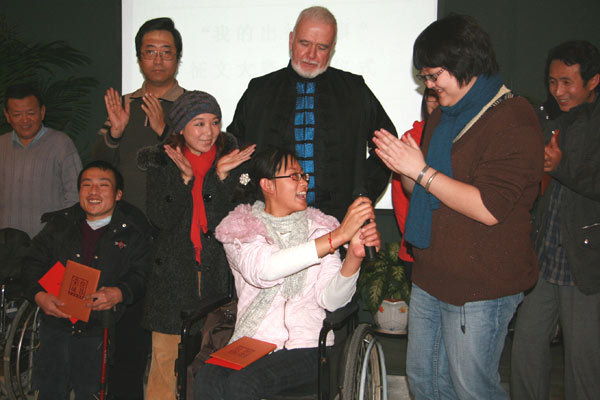Disabled eager for wall-less world
Over 30 people with disabilities, researchers, and NGO founders gathered in Beijing on Saturday and discussed the current state of barrier-free infrastructure in China and decided to create China's first barrier-free touring map.
The workshop was organized by Enable Disability Studies Institute, an NGO that promotes accessibility for people with disabilities to integrate into society.
Dr. David Tool, a professor from Beijing International Studies University, said accessibility means full access for unaccompanied wheelchair users. He believes that if a barrier-free infrastructure were fully functional and convenient, people with disabilities could live independently and go outdoors bravely with dignity.
Dr. Hu Zhongming, a researcher from China Disabled Persons' Federation (CDPF), revealed the latest legislative progress in disability rights protection. "Regulations on barrier free for the disabled will be released next year. It will be a catalyst to improve barrier-free constructions in China," he said.
Grassroots NGO operator Zou Fang has organized several barrier-free tours and encouraged the disabled to go out with the help of their counterparts instead of family members. "It's a challenging task to create a barrier-free tour map in China, but I believe we can make a huge difference if we work together," he said.
Debate on historical site protection
Before the Olympic Games, Beijing installed barrier-free access points at famous historical sites such as the Forbidden City, the Summer Palace, Temple of Heaven, and the Great Wall, including vertical conveyors, stepping machines and ramps.
However, it has triggered an enduring debate after the Games. The State Administration of Cultural Heritage described these access points in the Forbidden City and the Great Wall as "temporary," according to an official document published on its website. Many cultural site specialists thought these modifications damaged the sites through wire arrangements and that some ramps significantly detracted from the beauty.
56-year-old Chen Zengshun who suffers from poliomyelitis and has a steel plate implanted along with six nails does not agree with that opinion. "These access points not only enable us to tour the famous scenic spots in person, but also make them accessible for the senior citizens. We must balance the public good with cultural preservation, but it definitely doesn’t mean we should remove them," he said.
The institute released a study "A Wall-less World: A Profile of Accessibility and Historic Preservation in Different Countries or Regions," which provides various examples in eight countries and regions. "We'd like to offer different angles to solve this problem and initiate sufficient discussions," said Wan Fang, one of the writers.
 0
0 







